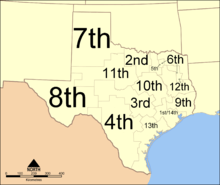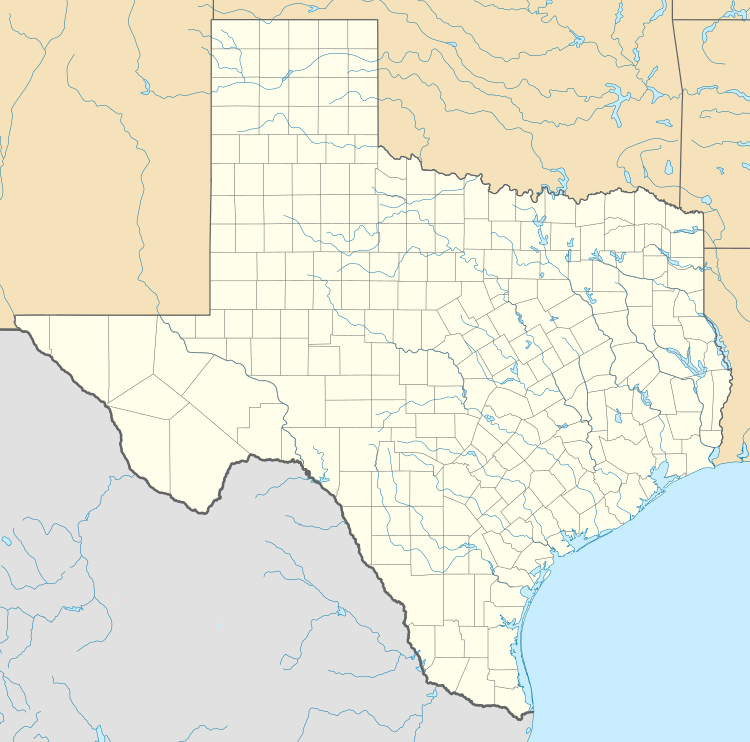Texas Courts of Appeals
The Texas Courts of Appeals are part of the Texas judicial system. In Texas, all cases appealed from district and county courts, criminal and civil, go to one of the fourteen Texas Courts of Appeals, with one exception: death penalty cases. The latter at taken directly to the Texas Court of Criminal Appeals, the highest Texas court for criminal matters. The court of last resort for civil cases is the Texas Supreme Court. The number of justices on each intermediate court of appeals is set by statute.
The total number of appellate court seats currently stands at 80, ranging from three to thirteen per court. To equalize case loads, the Texas Supreme Court regularly transfers batches of cases from one court to another. The transferee court must then apply the case law of the court from which the case was sent, rather than its own. Appellate courts consisting of more than three justices hear and decide cases in panels of three. Occasionally, the entire court sits en banc to reconsider a prior panel decision and to assure consistency in the court's jurisprudence. The en banc process is also used to overrule prior precedent of the same court that its panels are bound by. The precedents established by a court of appeals are binding on the lower courts in its district.
The First and Fourteenth Court of Appeals, sitting in Houston, have overlapping appellate districts, and occasionally hand down conflicting ruling on the same legal issue. Such conflicts may ultimately be resolved by the High Courts whose decisions on questions of law are binding on all state courts.
The federal courts sitting in Texas apply state law when the case is not controlled by federal law or by the law of another jurisdiction based contractual choice of law or other basis for application of a different jurisdiction's law. Not infrequently the federal district courts sitting in Texas and the U.S. Fifth Circuit Court of Appeals make guesses as to how the Texas Supreme Court would rule on an issue of state law that is still unsettled due to a conflict among the intermediate courts of appeals.[1] Such an issue may also be referred to the Texas Supreme Court by certified question,[2] but this procedure is rarely employed.
Like the Justices of the Texas Supreme Court and the Judges of the Court of Criminal Appeals, the Justices of the intermediate Texas Courts of Appeals are elected in partisan elections to six-year terms. Many, however, are initially appointed by the Texas Governor to fill vacancies and then run as incumbents in the next election.
History

Courts of civil appeals in Texas were established in 1891 by constitutional amendment to help handle the increasing load of the court system. They had jurisdiction to hear appeals and mandamus of any civil case from their region, with the regions decided by the legislature. The amendment provided that three-judge courts of appeals were to be created by legislature, and in 1892, the legislature created 3 courts of appeals: The First Court of Civil Appeals in Galveston, the Second Court of Civil Appeals in Fort Worth, and the Third Court of Civil Appeals in Austin. In 1893, the legislature created the Fourth Court of Civil Appeals in San Antonio out of territory taken from the first and third courts, and the Fifth Court of Appeals in Dallas. In 1907, the legislature created the Sixth Court of Civil Appeals in Texarkana. Then in 1911, the Seventh Court of Civil Appeals in Amarillo and the Eighth Court of Civil Appeals in El Paso were created. Soon after that, the Ninth Court of Civil Appeals was created in Beaumont in 1915, the Tenth was created in Waco in 1923, and the Eleventh was created in Eastland in 1925.[3]
In 1957, after Hurricane Audrey severely damaged the Galveston County Courthouse, the legislature moved the First Court of Appeals to Houston (where it sits today) and required Harris County to provide facilities.[4]
It wasn't until the 1970s that any more courts were created with the Twelfth Court of Civil Appeals in Tyler, the Thirteenth in Corpus Christi, and the Fourteenth in Houston (created with concurrent jurisdiction with the First Court of Civil Appeals)[3]
In 1977, the legislature increased the number of judges of various courts and authorized courts of appeals to sit in "panels" of not fewer than three judges.[4]
On September 1, 1981, all Courts of Civil Appeals were given criminal jurisdiction, and in 1985 a constitutional amendment was passed so that all courts were known as "Courts of Appeals" instead of "Courts of Civil Appeals."[4] Until 1981, all criminal appeals cases went directly to the Texas Court of Criminal Appeals, and all cases involving capital punishment still do.[5][6]
Jurisdictions

There are fourteen districts of the Texas Courts of Appeals (in order):[7]
- First Court of Appeals of Texas – Houston (formerly Galveston), covering Austin, Brazoria, Chambers, Colorado, Fort Bend, Galveston, Grimes, Harris, Waller, and Washington counties
- Second Court of Appeals of Texas – Fort Worth, covering Archer, Clay, Cooke, Denton, Hood, Jack, Montague, Parker, Tarrant, Wichita, Wise, and Young counties
- Third Court of Appeals of Texas – Austin, covering Bastrop, Bell, Blanco, Burnet, Caldwell, Coke, Comal, Concho, Fayette, Hays, Irion, Lampasas, Lee, Llano, McCulloch, Milam, Mills, Runnels, San Saba, Schleicher, Sterling, Tom Green, Travis, and Williamson counties
- Fourth Court of Appeals of Texas – San Antonio, covering Atascosa, Bandera, Bexar, Brooks, Dimmit, Duval, Edwards, Frio, Gillespie, Guadalupe, Jim Hogg, Jim Wells, Karnes, Kendall, Kerr, Kimble, Kinney, La Salle, Mason, Maverick, McMullen, Medina, Menard, Real, Starr, Sutton, Uvalde, Val Verde, Webb, Wilson, Zapata, and Zavala counties
- Fifth Court of Appeals of Texas – Dallas, covering Collin, Dallas, Grayson, Hunt, Kaufman, and Rockwall counties
- Sixth Court of Appeals of Texas – Texarkana, covering Bowie, Camp, Cass, Delta, Fannin, Franklin, Gregg, Harrison, Hopkins, Hunt, Lamar, Marion, Morris, Panola, Red River, Rusk, Titus, Upshur, and Wood counties
- Seventh Court of Appeals of Texas – Amarillo, covering Armstrong, Bailey, Briscoe, Carson, Castro, Childress, Cochran, Collingsworth, Cottle, Crosby, Dallam, Deaf Smith, Dickens, Donley, Floyd, Foard, Garza, Gray, Hale, Hall, Hansford, Hardeman, Hartley, Hemphill, Hockley, Hutchinson, Kent, King, Lamb, Lipscomb, Lubbock, Lynn, Moore, Motley, Ochiltree, Oldham, Parmer, Potter, Randall, Roberts, Sherman, Swisher, Terry, Wheeler, Wilbarger, and Yoakum counties.
- Eighth Court of Appeals of Texas – El Paso, covering Andrews, Brewster, Crane, Crockett, Culberson, El Paso, Hudspeth, Jeff Davis, Loving, Pecos, Presidio, Reagan, Reeves, Terrell, Upton, Ward, and Winkler counties
- Ninth Court of Appeals of Texas – Beaumont, covering Hardin, Jasper, Jefferson, Liberty, Montgomery, Newton, Orange, Polk, San Jacinto, and Tyler counties
- Tenth Court of Appeals of Texas – Waco, covering Bosque, Brazos, Burleson, Coryell, Ellis, Falls, Freestone, Hamilton, Hill, Johnson, Leon, Limestone, Madison, McLennan, Navarro, Robertson, Somervell, and Walker counties
- Eleventh Court of Appeals of Texas – Eastland, covering Baylor, Borden, Brown, Callahan, Coleman, Comanche, Dawson, Eastland, Ector, Erath, Fisher, Gaines, Glasscock, Haskell, Howard, Jones, Knox, Martin, Midland, Mitchell, Nolan, Palo Pinto, Scurry, Shackelford, Stephens, Stonewall, Taylor, and Throckmorton counties
- Twelfth Court of Appeals of Texas – Tyler, covering Anderson, Angelina, Cherokee, Gregg, Henderson, Houston, Nacogdoches, Rains, Rusk, Sabine, San Augustine, Shelby, Smith, Trinity, Upshur, Van Zandt, and Wood counties
- Thirteenth Court of Appeals of Texas – Corpus Christi, covering Aransas, Bee, Calhoun, Cameron, De Witt, Goliad, Gonzales, Hidalgo, Jackson, Kenedy, Kleberg, Lavaca, Live Oak, Matagorda, Nueces, Refugio, San Patricio, Victoria, Wharton, and Willacy counties
- Fourteenth Court of Appeals of Texas – Houston, covering Austin, Brazoria, Chambers, Colorado, Fort Bend, Galveston, Grimes, Harris, Waller, and Washington counties
The 1st and 14th Court of Appeals share concurrent appellate jurisdiction over the same counties. The cases are assigned randomly. Per local rule, cases with prior appellate history (such prior interlocutory appeal or mandamus petition) are assigned or transferred to the court that docketed the prior matter. A party's notice of appeal must disclose such prior appellate history. Thanks to the docket equalization program of the Texas Supreme Court, the First and Fourteenth also hear transferred cases from other courts of appeals.[8]
The counties of Gregg, Rusk, Upshur, and Wood are in the jurisdictions of both the 6th and 12th Courts, while Hunt County is in the jurisdiction of both the 5th and 6th Courts.
References
- ↑ Boren v. U.S. Nat'l Bank Ass'n, 807 F.3d 99, 105-6 (5th Cir. 2015)(Where, as here, the proper resolution of the case turns on the interpretation of Texas law, we are bound to apply Texas law as interpreted by the state's highest court." Am. Int'l Specialty Lines Ins. Co. v. Rentech Steel LLC, 620 F.3d 558, 564 (5th Cir.2010) (internal quotations and alterations omitted). Because the Texas Supreme Court has not decided whether a lender may abandon its acceleration of a loan by its own unilateral actions and, if so, what actions it must take to effect abandonment, we must make an "Erie guess" as to how the Court would resolve this issue. Id.)
- ↑ TEX. CONST. Art. V, § 3-c(a) ("The supreme court [has] jurisdiction to answer questions of state law certified from a federal appellate court."); TEX. R. APP. P. 58 (certified questions of law).
- 1 2 About the Court
- 1 2 3 Welcome to the official site of the First Court of Appeals of Texas!
- ↑ Justices of Texas 1836–1986 – Timeline of the Texas Supreme Court and Court of Criminal Appeals Archived 2007-08-10 at the Wayback Machine.
- ↑ Texas Court of Criminal Appeals
- ↑ Tex. Govt. Code Ann. §22.201 (Vernon 2005)
- ↑ "AMENDED TRANSFER OF CASES FROM COURTS OF APPEALS dated January 12, 2018" (PDF).

